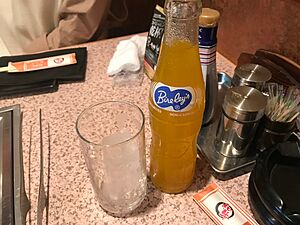Bireley's facts for kids
Bireley's is a well-known brand of fruit-flavored soft drinks. Unlike many sodas, these drinks do not have bubbles (they are non-carbonated). The company was started in California in 1923 by a person named Frank W. Bireley.
The Bireley's brand quickly became popular across the United States. A large company called General Foods bought it in 1943. Over time, Bireley's stopped being sold in its home country. However, it is still available in Japan, made by Asahi Soft Drinks. Until 2019, it was also sold in Thailand. As of 2025, Bireley's drinks are only found in Japan.
Contents
The Story of Bireley's Drinks
How Bireley's Started
The Bireley's brand began with Frank Bireley's orange juice business. He started by selling fresh squeezed juice to other students. This was when he was studying at Stanford University.
His juice business became very successful. Frank Bireley decided to leave university. In 1923, he started his own company, the Frank W. Bireley Company.
The first Bireley's product was called Bireley's Orangeade. It was made at the company's main factory in North Hollywood. Later, in 1937, the company opened another bottling plant in Oakland.
Growing Across the Country
Bireley's also made deals with local bottling companies. This helped their drinks be sold all over the United States. The company even created a special machine. This machine could automatically squeeze juice.
The process involved juicing, heating to kill germs (pasteurization), and making the juice stronger (concentration). Then, this strong juice was sent to bottling plants. There, it was mixed with water and sugar.
Bireley's advertised that their drinks had no bubbles. They said this was a good thing. By 1942, the company was making about 58 million bottles of drink each month. Frank Bireley became known as the "orange juice king."
Becoming a Global Brand
In 1943, General Foods bought the Bireley's company. Bireley's became a part of General Foods. Frank Bireley continued to manage the brand.
New flavors were added to the Bireley's lineup. The brand also started to sell its drinks in other countries. It was known as Bireley's California Orange in many places.
Bireley's began selling in Thailand in 1950. In Japan, Asahi Soft Drinks started making the drink in 1951. Bireley's was very popular in many countries during the 1950s, including the Philippines.
Bireley's in Pop Culture
In Japan, Bireley's had a strong connection with Toho Pictures. This was during the 1960s and 1970s. Bottles of Bireley's drinks were often shown in Toho's kaiju monster movies. This was a way to advertise the drink.
Changes Over Time
In 1959, General Foods sold its Bireley's business to a company called Krim-Ko. Over the next few decades, Bireley's disappeared from most markets.
By the 1990s, the international parts of the business were owned by TLC Beatrice. Bireley's was only still sold in Thailand and Japan. Asahi had bought the rights to the Bireley's name in Japan in 1980.
In 2000, TLC Beatrice sold its share in Bireley's Thailand to Pokka Singapore. However, Pokka soon sold it to Thai investors in 2003. The business was losing money.
The Brand's Final Chapter (Outside Japan)
In 2010, a Thai group called Sunny Herb International Beverage bought the rights to the Bireley's brand. This was for all twenty countries where it was registered, except Japan.
In 2014, the Thai beverage company Ichitan bought these rights. They also bought all of Bireley's business and factories in Thailand. Ichitan paid 1.78 billion baht (about US$55 million).
Ichitan hoped to make the brand popular again. They also wanted to sell it in more foreign markets. They had some success with early advertising. However, their efforts did not meet expectations. The Bireley's product line in Thailand was stopped in 2019. This left Japan as the only place where the brand is still sold.
See also
- Green Spot (soft drink), another orange drink from California that gained wider popularity in Asia
 | Chris Smalls |
 | Fred Hampton |
 | Ralph Abernathy |


